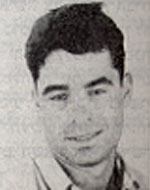Yehuda, son of Leah and Benjamin, was born on 28.2.1941 in Kibbutz Afikim, where he completed elementary school at Afikim and later completed high school at the Beit Yerah school in the Jordan Valley, He, as his friends and family called him, was the “king” of the elementary school class and was a central figure in all the activities of the youth society. His friendly smile, his willingness to help others always, and his honest modesty, have acquired the Lev of every person – young and old alike. He was an active participant in kibbutz life, and from an early age he joined his fellow farmers in agriculture, and as a member of the kibbutz he was an active participant in kibbutz life. Yehuda’s greatest love was nature, including trips to the land, and he was a member of the traveling circle and of Gadna-Sayarim, who toured the length and breadth of the country and knew all its hidden paths. He made sure to organize the trips, arrange and prepare all that was necessary, and guide the travelers. Apart from his interest in the sites and their landscapes, Yehuda was also interested in the archeology and geology of the various places and the country in general. In his love of nature, his love for nature also integrated into animals. He tried to study the various kinds of animals in Israel, and he himself raised mail pigeons, in a training and breeding campaign that many of his classmates shared. Yehuda was drafted into the IDF in early August 1959 and volunteered for the paratroopers ‘paratroopers’ unit after serving as a parachutist in a paratrooper course and a sniper course, and was chosen to serve in this unit despite the difficulty and effort involved. In the Six Day War he participated in the conquest of the Old City and then fought in the battles of the Golan Heights, and after his regular service, Yehuda returned to the army, To his kibbutz, Afikim, and spent a year there Served at Kibbutz Yotvata, near Eilat, and after a year of service in Yotvata he went on a special vacation and worked as a chemist on the Palmach ship of Hakibbutz Hameuchad, along the Mediterranean and British coast lines. He worked for eight months on this job and when he returned to Israel he returned to Kibbutz Afikim and began working in the vineyard sector. Here too he excelled in his dedication and willingness to invest in work far beyond what was needed, and soon became the center of the industry. At the same time he worked as a counselor in the local children’s company, and mainly guided youth and kibbutz members on trips. In his work as a guide Kaddish, as is his wont, pays attention to every detail in every action, especially in the camps and trips. At the same time, he found time to listen to each apprentice and paid attention to every problem raised before him. In 1971 he married Shula, the Yotvata company, who joined him in Afikim, and a year later his daughter Carmit was born. This name was given to her because of his deep love for the vineyard in which he worked. In the same year, Yehuda began studying at the Avshalom Institute for the knowledge of the country, near Tel Aviv University. During the Yom Kippur War, Yehuda participated in the braking battles and succeeded against the Egyptians in the Sinai. On October 19, 1973, Judah was killed and killed in the shelling west of the Canal, at the junction of the Abu Sultan camps. He was laid to rest in the cemetery in Afikim. He left behind a womanAnd daughter, parents and brothers. After his fall, he was promoted to First Sergeant. His family and friends published a pamphlet in his memory, including friends’ comments on his character and letters he sent to friends at various times in his life; The family and Kibbutz Afikim, in cooperation with the Avshalom Institute, published a booklet called “The Jerusalem Bridges” from material found in Judah’s estate and should serve as a basis for his seminar work on this subject.
